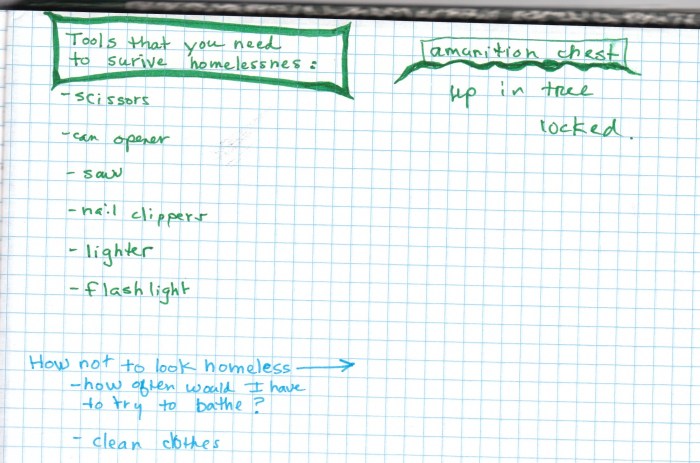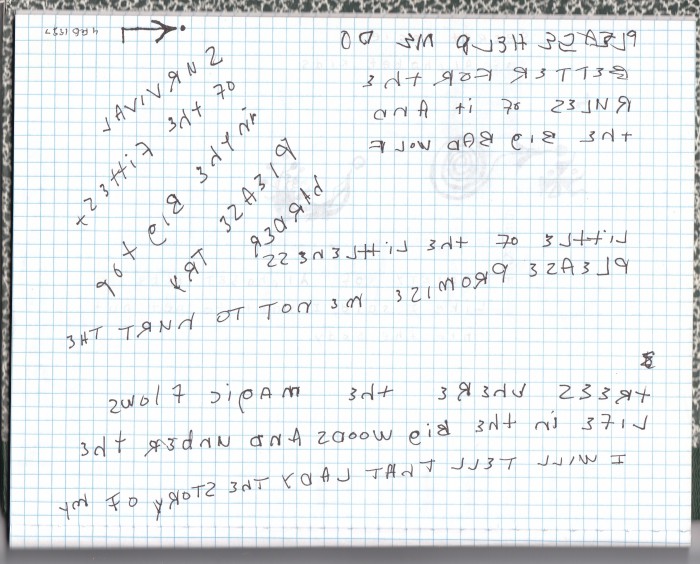I was hospitalized in the winter of 1997. And from what I can tell about that
time—reading journals, watching video-taped therapy sessions, looking at art—I was unequivocally crazy, insane in every conceivable sense of the word. Not that I wasn’t exactly that during other hospital stays. However, during February and March of ’97, my insanity was off the charts.
I’m still trying to understand what happened—still trying to assemble some sense of where I went wrong, what set me off. And to be honest, I’m not sure I understand any more now than I did before. I was so insane, none of what I wrote helps me recreate what happened.
I do, however, notice at least two themes I’ve alluded to before—namely my fear of homelessness and my sense that the hospital was home.
I guess this takes me back to the mental health housing series I began a month or so ago but never finished. The first post in that sequence explores my belief that the hospital was where I belonged, where I felt safe, especially during an inpatient stay during the spring of 1990. However, that feeling returned during the times I’ve been most ill in subsequent years, as well. And the winter of 1997 was no exception.
For example, at 8:30 pm on February 2, 1997, three days after being admitted, I wrote:
I want to stay in the hospital for a very long time. I want this to be my
home . . . . I’d just prefer to stay here.
I went on to explain that I knew this desire was crazy in and of itself—that it was not normal, nowhere near normal, to want to be locked up in a psychiatric facility.
However, this refrain repeats itself often during the course of my illness—regularly and without fail. I remember thinking this from time to time, but I hadn’t realized how often I expressed that desire overtly in the journals I kept.
It’s clear the illness terrified me. I knew I was sick. I desperately wanted help and apparently knew on some level that the hospital could keep me safe—not so much from suicide (as I was not often actively suicidal at that time) but from a profound inability to function and take care of myself.
I’m not sure what precipitated this collapse, though just before this admission, I was obsessed with a fear of homelessness again—seemingly because my social security disability benefits were being reviewed, I feared losing them, and knew I was not able to function well enough to work. It’s hard to imagine how that fear impacted me, whether that’s what triggered this dizzying psychosis.
However, just two weeks before being admitted and around the time I began to unravel, I made this list—a seeming attempt to survive should I lose my little apartment in east Dallas:
As I review the video-taped therapy sessions, I realize that my therapist repeatedly encouraged me to share my financial struggle with my family—something I refused to do, insisting that the very real possibility that my only remaining parent would respond with indifference to my dilemma, was too
terrifying a risk to take—that my psyche would not be able to tolerate that
degree of rejection, especially since, when I one time needed help purchasing
medication, I had, in fact, met with unwillingness.
So, I don’t know now if that was an accurate perception on my part. I’d like to think I was wrong.
However, during this same hospitalization I also did a decent amount of what I think is called mirror writing–writing words backwards and forming letters in reverse.
In one instance, I was cognizant enough to make a list of things to tell my friend Georgia–to create a list of items I wanted her to bring me, but crazy enough to compose the whole thing in reversed writing:
In other instances I would begin sentences in the bottom, right-hand corner of the page–writing from right to left, bottom to top, as I did in the ramble about “woods” and “wolves” below:
The three lines at the bottom read:
I will tell that lady the story of my life in the big woods and under the trees where the magic flows.
I truly have no idea why I suddenly began writing in reverse, if perhaps it was paranoia that motivated me–fear that someone might read what I wrote. I’m baffled by this and have not found any explanations in the literature as to why I might have suddenly done this. I do know that Leonardo da Vinci wrote all of his personal journals in reverse and that left-handed people are more able to do this than are the right-handed. I don’t understand brain chemistry well enough to offer a reasonable explanation, and don’t know if something neurological might have been happening. However, the most obvious explanation remains paranoia, I assume.
I might also surmise that there was something about this particular psychosis that made me obsess about mirrors and write in reverse as part of that obsession, for some of the mirror writing I did was in fact about mirrors–quoting the line from Snow White, “Mirror, mirror on the wall, who’s the fairest one of all:”
I clearly lack the clinical expertise to explain any of this, though it seems my thinking had the bizarre features associated with a fairly severe psychosis.
The fact remains—I lost my mind. I lost it in a big way
I expect more evidence of this will follow in subsequent posts, as I think I got worse that winter before I got better—so stay tuned for more detailed descriptions of Kathy’s wacky ways in the winter of ’97— ways weirder than this semi-sane version of me might like to admit.




Amazing post. I am left-handed but definitely not capable of writing in reverse. Those notes are incredible and clearly brilliant. Jeez Kathy, I’m just really glad you’re better now.
LikeLike
Wow–isn’t that the truth! I don’t know that they are brilliant, but they are indeed psychotic–so often there’s such a fine line between the two. Here I”m afraid I may just have been out of my mind. But you know–I’m not left -handed–at all–ever, which is kind of weird. Brain chemistry is such an incredibly complicated and delicate thing!
I’m glad this post spoke to you, Heather. So often it’s hard to tell what works and what doesn’t, so your ! Thank you!
LikeLike
I haven’t suffered a mental disorder and am entirely unfamiliar with it, but I find myself relating to some of this. Your article is beautiful.
LikeLike
Thanks so much for taking the time to read and comment! I’m glad this post spoke to you. Sometimes I think there is a common thread that ties human expereince together–a common undercurrent–sane or otherwise. It would be awesome if this post could have tapped into that–so thank you! I hope you will stop by again! It was great having you!
LikeLike
This is fascinating. What strikes me most is that you can’t remember the whys and wherefores now that you’re out of that severe state of mind.
Do you also have copies of your hospital records and charts? That might be another jumping-off point for research. Still, the videotaped sessions seem like the pot of gold for reconstructing these years.
I realized at a young age that something was wrong with me and that I’d have to be “taken care of.” That sense of relief in the hospital was so unexpected–it was probably the sanest thought in my head.
LikeLike
No, I don’t remember any kind of “why” about this weird writing. What I do recall is that it just seemed to happen. I found myself doing it, as if there was no volition involved–almost like automatic writing–if that makes any sense.
I don’t have copies of the hospital records, but I do have copies of my outpatient records. I have intended to gather hospital records, but I was an inpatient so many times in so many places, it feels like an overwhelming task to gather them all.
I too remember believing from a very young age that there was something about me that was very different from other people, but didn’t feel like I needed to be taken care of. I think I almost believed the opposite that–that no one was going to take care of me, if I didn’t do it myself. That doesn’t mean I didn’t fantasize that someone would. I remember feeling very alone–like it was just me alone that had to face the world.
LikeLike
I actually think your wanting to stay in the hospital makes perfect sense. After fearing becoming desolate, anyone would want to stay in a safe, clean, guarded place. It is about the most security I’m sure you could find at the time.
I’d love to hear more about this mirrored writing. Really fascinating, Kathy.
LikeLike
Yes, I guess it does, in a weird way. It may actually have been one of my sanest thoughts at the time–if that makes sense. Yes, Tori, thanks for pointing that out.
I too would love to know more about the mirror writing. There has to be something about it somewhere in the psychiatric literature, but I’m not sure how to find it.
Thanks for reading, my friend!
LikeLike
I agree that this makes sense. I may actually be one of my sanest thoughts at the time, if that makes sense. Thanks for pointing that out! I hadn’t even thought of that.
Also, I too would like to know more about the mirror writing, but have not been able to find much so far. There has to be something in the psychiatric literature, but I’m not sure how to track it down.
Thanks so much for your feedback, Tori. Hope you have a great weekend!
LikeLike
I agree, Tori.
Reading this, I feel like I have a better understanding of what my mom went through when we first tried to coax her toward getting professional assistance. What kept her away was fear of losing her house–through liens, through not being there and someone else stealing it, through a million other reasons she could think of.
We categorically addressed each of her concerns, but were unable (unsurprisingly, now) to ease her very understandable fear of being homeless. She’d fought hard to hold on to her house.
Her biggest fear–that she would articulate–was losing her home . . . or, as I read this post and its comments . . . her security.
Thank you, Kathy.
LikeLike
I’m so sorry to hear your mom struggled with mental illness! I think it would be really hard to have a parent with a psychiatric disorder–though I guess it’s not easy to have anyone you love so sick. It’s interesting though that your Mom also struggled with a fear of losing her home–feared homelessness. I think this speaks to just how vulnerable those with mental illness feel. It’s so scary to not be able to trust your own mind–not unlike what I imagine homelessness would feel like–both leave one feeling so exposed.
I want to thank you for stopping by, for taking the time to read and comment. It’s been great having you. I so hope you will come back!
LikeLike
Again I find you post and writing very insightful and the perspective is one critical for understanding what others are going through…thanks.
LikeLike
I’m so glad to hear you find this helpful, Charles! Thank you! Hope you’re having a lovely weekend!
LikeLike
ev’I syawla dah a kcank rof gnikaeps sdrawckab flesym.
taerg tsop!
LikeLike
How funny, Mark! Speaking backwards–now that would be a REALLY huge challenge! You crack me up!
LikeLike
That last comment by Mark was funny!
Oh there is so much here Kathy. It seems almost the ‘sane’ thing to do when really under severe stress, as your mind clearly was, to focus in, in on the basics to survival – where and how we live. it is fundamental and reading your post makes me feel you were trying to keep hold of something you knew instinctively, intuitively, (hard-wired maybe?) you needed. When I feel completely overwhelmed in my head I feel an almost frantic search for somewhere to ‘go’ to ‘house’ my mind and allow it to be mad but contained. Does that make any sense? Don’t answer that!
The mirrored writing also makes me think of needing to have your own language, way of expressing that you had a little control of? It reminded me of that phase in school when me and my best buddy made up our own coded language changing letters of the alphabet and it blew me away how quickly we became proficient at it when we passed each other little notes. Maybe your mind, that wasn’t really lost at all (but was stimulated neurologically), needed to be processing and expressing and you had just lost the usual way of doing that for a while. A way to have a conversation with two parts of your brain? Ok I’m stopping now, but just to say even in the depths of your illness you were a communicator and for that, I salute you.
LikeLike
Your thought that the badkward writing might be a way for two parts of my brain to communicate it fascinating–given just how split I feel, especially when doing the writing. It felt like automatic writing–like I was watching myself write and someone else was in control. So, yes, there may be something quite adaptive about it! Great insight, Penny!
LikeLike
PS I just wanted to add that this post also made me chuckle – from your title and when I first read the mirrored writing bit! It is funny!
LikeLike
So cool that you also managed to laugh. I tried to lighten the tone by adding just a hint of humor.
LikeLike
I’m glad you’re a little less “wacky” now, Kathy…
I have trouble making my regular “3’s” legible…I can’t imagine trying to write them backward!
Hugs,
Wendy
LikeLike
Me too! I could never write backward now either! I don’t know how I did it–or why for that matter!
LikeLike
It is interesting how even at the height of your insanity, you still maintained some ability to think logically – making lists of things you need. Even the reverse writing – though probably a result of extreme paranoia – shows a great deal of mental ability.
LikeLike
I guess that might be one of the misunderstandings folks have about mental illness. Though it confuses one’s sense of what’s real and what’s not real, it doesn’t ncessarily preclude logic or the ability to think–if that makes sense.,
LikeLike
Back in university, we were given an opportunity to speak with long-term prison inmates. The ones that were still incarcerated expressed terror at being released into the “real world” again, and the ones that were recently released admitted how difficult it was to adjust to life outside the walls. I think your sense of comfort in the hospital makes perfect sense, especially given your fear of being homeless otherwise. Another great post, Kathy– thank you!
LikeLike
Fascinating, Dana! I imagine that was an incredible opportunity. I would love to see a study of just how many psychiatric patients feel this way. Thanks for reading. Hope your week is going well!
LikeLike